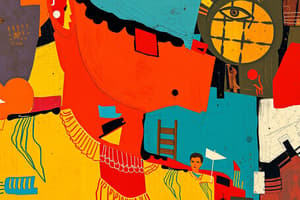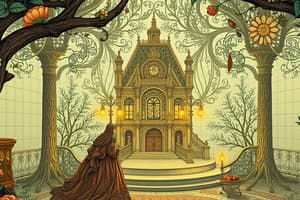Podcast
Questions and Answers
What is literature?
What is literature?
- Only written works of fiction that have artistic value
- Oral stories passed down through generations
- Written works of fiction and non-fiction that have artistic, intellectual, or emotional value (correct)
- Only digital forms of writing
What is an example of non-fiction literature?
What is an example of non-fiction literature?
- Novel
- Poem
- Biography (correct)
- Drama
What is the literary device that uses objects to represent abstract ideas?
What is the literary device that uses objects to represent abstract ideas?
- Imagery
- Irony
- Allusion
- Symbolism (correct)
What is the name of the literary movement that emphasizes emotion, imagination, and nature?
What is the name of the literary movement that emphasizes emotion, imagination, and nature?
What is the focus of New Criticism?
What is the focus of New Criticism?
What is the literary device that uses contradiction or incongruity to convey meaning?
What is the literary device that uses contradiction or incongruity to convey meaning?
What is the name of the literary period that saw the revival of classical forms?
What is the name of the literary period that saw the revival of classical forms?
What is the literary device that hints at events that will occur later in the story?
What is the literary device that hints at events that will occur later in the story?
What is the critical approach that analyzes literature through the lens of class struggle and economic systems?
What is the critical approach that analyzes literature through the lens of class struggle and economic systems?
What is the literary device that uses language to create vivid sensory experiences?
What is the literary device that uses language to create vivid sensory experiences?
What is the critical approach that examines representations of gender and power dynamics in literature?
What is the critical approach that examines representations of gender and power dynamics in literature?
Flashcards are hidden until you start studying
Study Notes
Definition and Scope
- Literature refers to written works of fiction and non-fiction that have artistic, intellectual, or emotional value.
- It encompasses various forms, including poetry, drama, novels, short stories, and essays.
- Literature can be oral, written, or digital, and can originate from any culture or language.
Major Forms of Literature
- Fiction:
- Novels
- Short stories
- Poetry
- Drama (plays)
- Non-fiction:
- Biographies
- Memoirs
- Essays
- Historical accounts
- Scientific and technical writing
Literary Devices and Techniques
- Imagery: using language to create vivid sensory experiences
- Symbolism: using objects, colors, or characters to represent abstract ideas
- Irony: using contradiction or incongruity to convey meaning
- Allusion: referencing other texts, myths, or historical events
- Foreshadowing: hinting at events that will occur later in the story
Literary Movements and Periods
- Ancient Greek Literature (8th century BCE - 4th century CE):
- Epic poetry (Homer)
- Tragedy (Sophocles, Euripides)
- Renaissance Literature (14th - 17th centuries):
- Revival of classical forms
- Emergence of sonnets and blank verse
- Romanticism ( late 18th - early 19th centuries):
- Emphasis on emotion, imagination, and nature
- Notable authors: Wordsworth, Coleridge, Byron
Critical Approaches and Theories
- New Criticism: focusing on the text itself, without considering authorial intent or historical context
- Marxist Criticism: analyzing literature through the lens of class struggle and economic systems
- Feminist Criticism: examining representations of gender and power dynamics in literature
Definition and Scope
- Literature encompasses written and oral works of fiction and non-fiction that have artistic, intellectual, or emotional value.
- It includes various forms such as poetry, drama, novels, short stories, and essays.
- Literature can originate from any culture or language and can be in oral, written, or digital form.
Major Forms of Literature
- Fiction includes novels, short stories, poetry, and drama.
- Non-fiction includes biographies, memoirs, essays, historical accounts, and scientific and technical writing.
Literary Devices and Techniques
- Imagery is used to create vivid sensory experiences through language.
- Symbolism represents abstract ideas using objects, colors, or characters.
- Irony conveys meaning through contradiction or incongruity.
- Allusion references other texts, myths, or historical events.
- Foreshadowing hints at events that will occur later in the story.
Literary Movements and Periods
- Ancient Greek Literature spanned from 8th century BCE to 4th century CE and included epic poetry and tragedy.
- Renaissance Literature, from 14th to 17th centuries, saw a revival of classical forms and emergence of sonnets and blank verse.
- Romanticism, from late 18th to early 19th centuries, emphasized emotion, imagination, and nature, with notable authors including Wordsworth, Coleridge, and Byron.
Critical Approaches and Theories
- New Criticism focuses on the text itself, ignoring authorial intent or historical context.
- Marxist Criticism analyzes literature through the lens of class struggle and economic systems.
- Feminist Criticism examines representations of gender and power dynamics in literature.
Studying That Suits You
Use AI to generate personalized quizzes and flashcards to suit your learning preferences.




